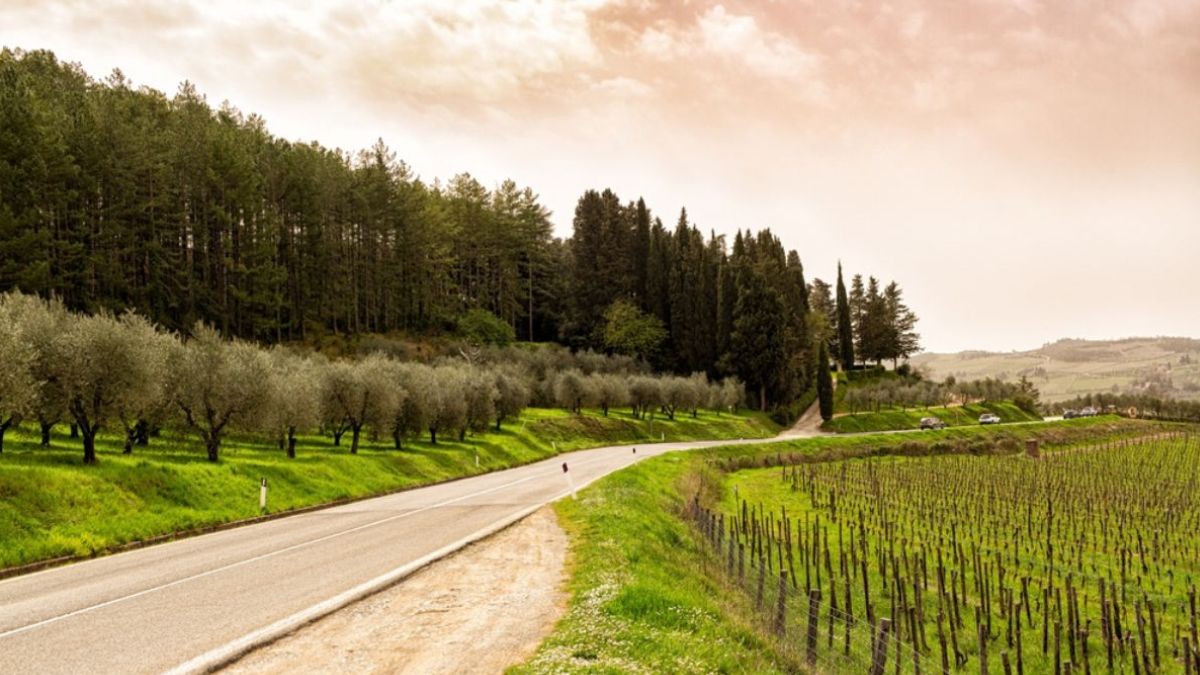Strada Chiantigiana: Driving through Tuscany with Forster, spaghetti worms and sprezzatura

Put the car in gear and hit the open road: Italy comprises nearly 6,400 km (4,000 miles) of Autostrada and 2,88,000km (180,000 miles) of secondary roads. The country also has just about as many kinds of terrains as it does types of pasta, from flower strewn meadows to forested valleys, lake hugging villages to switchback studded alpine peaks all perfect for exploring by car.
While I love a scenic train ride, relaxing ferry jaunt or budget bus adventure, the freedom that comes with my own four wheels is hard to beat. You can stop for a cool beverage at a roadside café; spend the afternoon strolling through hilltop villages; take a hike in one of the many national or regional parks. It’s all about taking in Italy at your own pace and pleasure.
Strada Chiantigiana: From Florence to Siena
Also known as the Chianti wine road (SR222), this magnificent thoroughfare is like a painting by a Renaissance master. Carving through one of Italy’s largest wine growing and olive oil producing regions, the undulating hills and wide open spaces link Florence with the city of Siena. All along the 69-kilometre (43 mile) drive, the road is dotted with picturesque borgos, towns and villages where you can stop and get a taste of Tuscany’s eternal appeal.
But this time, I was subconsciously searching for a deeper message, that subtle narrative thread in E.M. Forster’s Where Angels Fear To Tread. The Home Counties mother, sending her solicitor son Philip (me, in spirit) to Poggibonsi to rescue the daughter in law from the Italian labourer Gino a story of cultural clash and uneasy love. I found myself feeling Forster’s sharp English gaze upon Italy, the country he adored, yet viewed with a wary, sometimes snobbish eye.
I imagined the scene: the English love for Italy sun, history, romance but not quite for the Italians themselves. Forster’s vivid description of “spaghetti worms disappearing into his mouth, wiped away by a tomato stained napkin” lingered in my mind like a tomato stain on memory. That delicious, messy contradiction of Italy beauty and chaos, grace and grit, the eternal tension between the perfect and the imperfect.
Somewhere between Florence and Siena, I found that tension on full display. The hills rolled out like a fresco; vineyards nodded in the breeze; the cypress trees stood sentry like ancient guards. And yet beneath this perfect picture, the human stories played out in all their flawed glory, the gossip at the café, the stubborn pride of the locals, the endless dance between hospitality and suspicion.
Back home in my village in Garfagnana, after a morning of forest bathing around Parco dell’Orecchiella, barefoot grounding in the damp earth, and listening to the wind making love to the leaves and branches, I felt a deep sense of sprezzatura ,that effortless grace Italians seem to carry in their bones. The slow, deliberate unhurriedness that turns a grilled bistecca fiorentina into a ritual and a feast, and a walk in the woods into a hymn.
I sometimes catch myself in the piazza, coffee in hand, watching the world with that same half amused, half melancholy air that Forster might have recognised. The locals chatter and gesticulate, as the sun casts long shadows over ancient stones. Here, the Englishman and the Italian meet without needing to speak, just a shared love of slow time, of life savoured piano piano.
And I realise, with a smile, that I have become part of this long, ongoing conversation between two cultures one polite, reserved, sometimes faintly appalled; the other loud, warm, and utterly unbothered. Both flawed. Both beautiful. Both utterly inseparable.
So, whether you’re behind the wheel of a Golf GTD on the Strada Chiantigiana or barefoot in the forest breathing in the scent of pine and earth, there’s a lesson here: embrace the contradictions, revel in the slow moments.
Piano piano, my friends “The way we fit together, it’s like we’re meant to be, and right here and right now, this is paradise to me” says Bryan Adams’ in “Where Angels Fear to Tread”.
This low, imperfect dance between cultures is paradise to me. Always keep that napkin handy.
Society